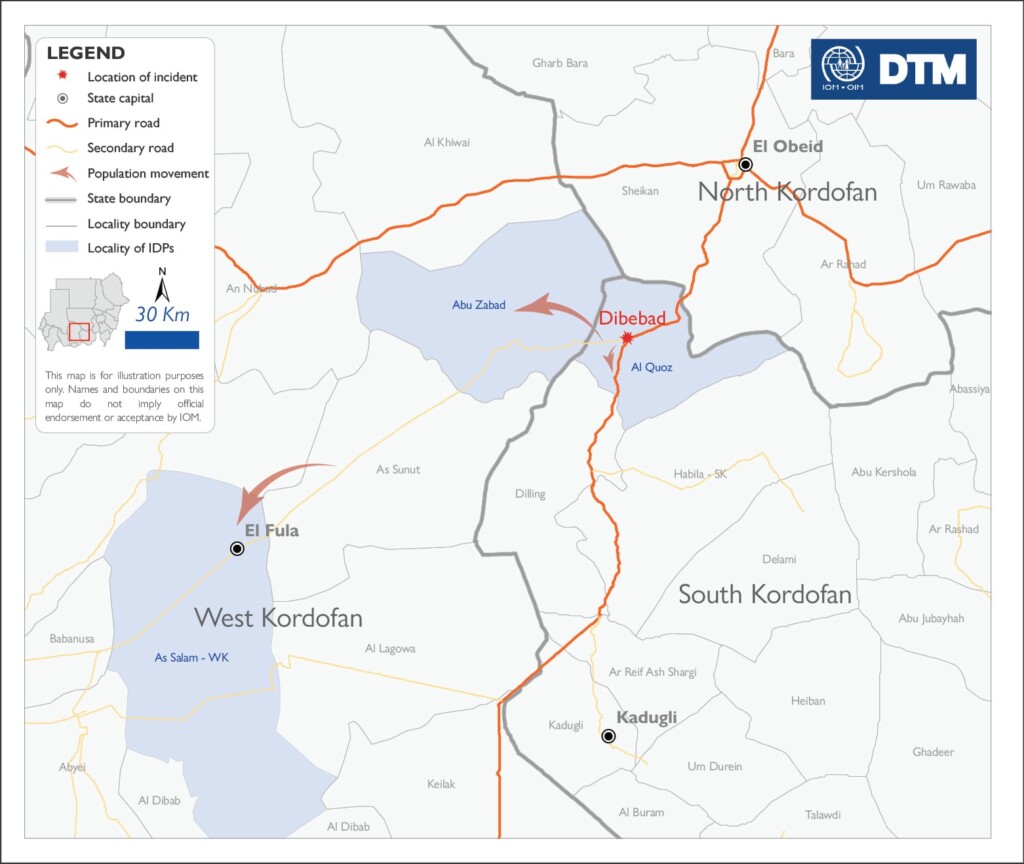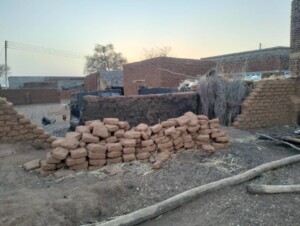Ongoing clashes cause mass displacement in South Kordofan

Displacement from Dabaibat in South Kordofan - May 2025 - Source: Displacement Tracking Matrix)
At least 565 families have displaced from Dibebad in South Kordofan on Friday due to clashes between the army and the Rapid Support Forces (RSF). The Sudanese Armed Forces (SAF) claim control of the area after days of fighting, as the RSF withdrew towards the area of Dabakar and Abuzbad in West Kordofan.
Through their attack on Dibebad, the armed forces say they are trying to open the road between El Obeid and Dilling, which has been closed since the outbreak of the war.
The International Organization for Migration (IOM) says the displaced fled to other areas in the localities of Al Quoz and Salam in South Kordofan and Abu Zabadfi in West Kordofan.
On Saturday, armed forces launched drone attacks on the Dabakar and Abu Zabad areas of South Kordofan. On Sunday morning, soldiers in the armed forces released a video in which they announced their control of Hafra Sadu north of Mujallad in West Kordofan state.
In its latest mobility update, the IOM Displacement Tracking Matrix (DTM) provides an overview of the total population of internally displaced persons (IDPs) in Sudan, including those displaced both before and after the onset of the conflict on 15 April 2023. Compared to Sudan Mobility Update (16), the estimated total of IDPs decreased by 7 per cent due to return movements.
An estimated total of 10,538,960 IDPs were displaced to 10,336 locations, in 185 localities, across all 18 states in Sudan. An estimated 8,131,747 individuals were displaced internally within Sudan since 15 April 2023. Approximately 3,992,751 individuals crossed borders into neighbouring countries since 15 April 2023. The top states of origin were Khartoum (30%), South Darfur (20%), and North Darfur (18%). The highest proportion of IDPs were hosted in South Darfur (16%), North Darfur (16%), and River Nile (8%) states. Over half (52%) of IDPs were reportedly children under the age of 18-years-old.
Drone attacks
Drone attacks have recently struck multiple areas across Sudan — including cities like Port Sudan, Kassala, Omdurman, as well as locations in Gedaref, River Nile, White Nile and North Kordofan states — damaging critical infrastructure, disrupting civilian access to power and water, and triggering displacement. While humanitarian partners’ premises have not been directly targeted, the strikes have disrupted access to power and fuel, which has in turn affected hospitals, water services and aid logistics. The Resident and Humanitarian Coordinator for Sudan, Clementine Nkweta-Salami, condemned the targeting of civilian infrastructure and reiterated the legal obligation under international humanitarian law to protect civilians and the services they rely on.
She urged all parties to refrain from actions that jeopardize lives or disrupt the humanitarian response. She said: “Such attacks will deepen humanitarian suffering and needs, as well as exacerbate the already severe access and logistical challenges that humanitarian actors face in the delivery of urgently needed aid to the rest of the country.”











 and then
and then